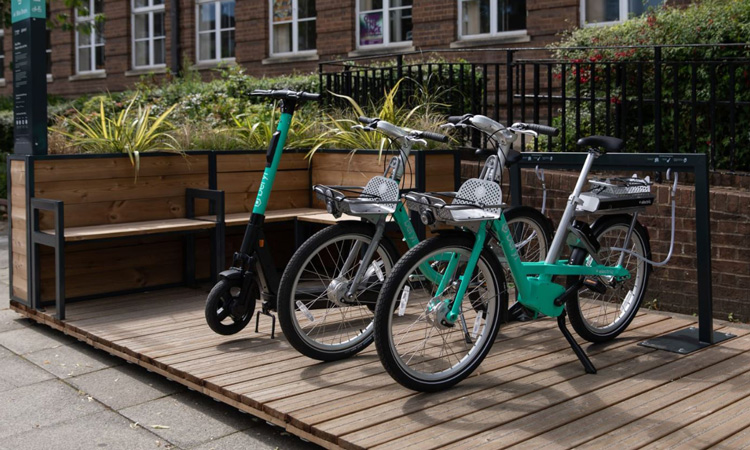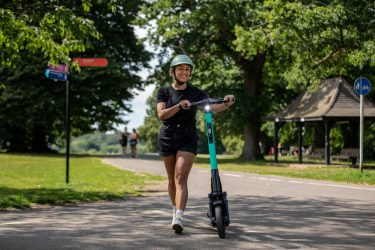How micromobility parking can create healthier and happier streets
- Like
- Digg
- Del
- Tumblr
- VKontakte
- Buffer
- Love This
- Odnoklassniki
- Meneame
- Blogger
- Amazon
- Yahoo Mail
- Gmail
- AOL
- Newsvine
- HackerNews
- Evernote
- MySpace
- Mail.ru
- Viadeo
- Line
- Comments
- Yummly
- SMS
- Viber
- Telegram
- Subscribe
- Skype
- Facebook Messenger
- Kakao
- LiveJournal
- Yammer
- Edgar
- Fintel
- Mix
- Instapaper
- Copy Link
Posted: 23 July 2020 | Philip Ellis - Beryl | No comments yet
Beryl CEO Philip Ellis discusses the ways in which integrated parking systems for micromobility devices such as e-scooters and e-bikes can contribute to the coronavirus recovery as well as climate change mitigation.


One of the largest headaches councils have faced since the wave of micromobility services entered their streets is where the respective vehicles should operate, as well as where they should be parked when they’re not in use. As many UK cities vye to implement e-scooters, or joint mobility solutions alongside bike share schemes, it’s important to think about the physical and social infrastructure that can lead to healthier and happier streets.
COVID-19 has wreaked havoc on the micromobility industry, but there is a chance to emphatically bounce back as much of the wider public search for sustainable, open-air and single-rider transport alternatives. It’s clear bikes, e-Bikes and e-scooters can all help with this. What is less clear, is the way we integrate e-scooters into existing parking guidelines with bike share schemes.
It’s pivotal that those who are going to be impacted by schemes are part of the conversation, especially those who won’t actually take a ride
The traditional micromobility docking station is the most widely recognised parking solution, but it is a problem for many reasons. They are big and expensive, but just as importantly often ugly things that don’t contribute positively to streets or their residents – at best it is two or three people a day who dock the bike. There are few examples of traditional docking infrastructure being introduced in bike share schemes across the UK that have weaned themselves off public subsidy successfully. The pace of change in the micromobility sector, and the technology it uses, is quicker than the length of public sector contracts that are important to guaranteeing a service.


There’s a false narrative that traditional docks mean fewer lost bikes, and so it is flawed logic to think that traditional docking stations will be the biggest determining factor in assuring security. We have the privileged position of delivering tracking technology to some high profile docked based schemes, and through that we are helping to decrease their loss rates. Reliable tracking and diligent operations teams are proven to be far more effective in protecting micromobility vehicles.
The pace of change in the micromobility sector, and the technology it uses, is quicker than the length of public sector contracts that are important to guaranteeing a service
Perhaps the most vital act that cities should take to ensure parking solutions suit their shared micromobility schemes, is to let those who use schemes be the ones who design it. Research shows that users appreciate the flexibility of the dockless or demarcated models that allows known drop-off and pick-up spaces as well as the reliable supply of vehicles within close distances. This mode is relatively inexpensive and quick to install or expand as well as easily understood by the general public.
Philip Ellis will be speaking at Intelligent Transport’s online Transport Innovation Summit in September 2020. To find out more and to register to attend, click here.


It’s pivotal that those who are going to be impacted by schemes are part of the conversation, especially those who won’t actually take a ride. In two of our schemes around 95 per cent of residents live within a five minute walk of a bay, which is important for us to deliver an equitable scheme and encourage lots of journeys, but it also means a lot of people are going to be impacted by the scheme being there.
We need our cities across the UK to encourage micromobility across numerous facets as we try to reduce the capacity on public transport and get people out of cars to help face the next global crisis: climate change. Parking is a huge part of this. If we can build spaces that are attractive and safe for people riding bikes and scooters, we can dramatically grow the amount of people that want to be involved in active transport.
Biography
As Co-Founder of Beryl, Philip Ellis has helped lead the business as a manufacturer of innovative consumer cycling products, to a global product and technology business supplying retail and bike-share systems. In 2019 Beryl launched its innovative bike-sharing systems and now deliver services to towns and cities across the UK.
Related topics
Air Quality, COVID-19, Infrastructure & Urban Planning, Mobility Services, Sustainable Urban Transport, Transport Governance & Policy
Related modes
e-scooters, Electric bikes
Related organisations
Beryl








